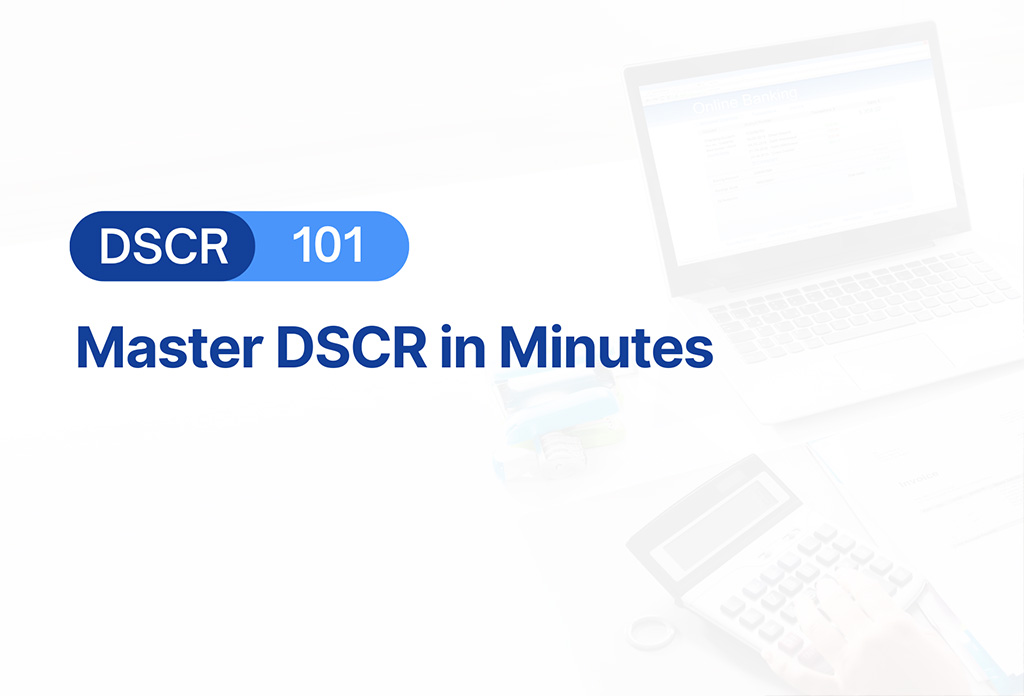Real estate investment in the US presents a compelling opportunity, driven by the country's diverse markets, expanding population, and strong economic fundamentals. However, securing financing for investment properties can be challenging. One option that has gained popularity among real estate investors is the Debt Service Coverage Ratio (DSCR) loan.
While DSCR loans provide several advantages, they also have certain limitations. Knowing both the benefits and potential downsides can help you decide if this financing option aligns with your real estate investment goals.
Understanding Debt Service Coverage Ratio (DSCR) Loans
A DSCR loan is a financing option where lenders evaluate the property’s ability to generate income relative to the debt obligations (i.e., the mortgage payments). Rather than focusing on the borrower’s personal income, as is the case with conventional loans, DSCR loans focus solely on the property’s cash flow. That’s why DSCR loans are especially attractive to real estate investors who rely on rental income rather than high personal earnings.
The ratio is calculated by dividing the gross rental income of the property by the total debt service (loan payments, taxes, insurance, hoa dues, etc.). For example, if a property generates $150,000 in annual gross rental income and has $100,000 in debt obligations, the debt service coverage ratio would be 1.5, indicating the property generates 50% more income than is needed to cover its debt obligations.
How DSCR Loans Work in Real Estate
DSCR loans work by evaluating the financial health of the property itself, not the borrower. The lender will review the property’s income-generating potential, to determine whether the property can cover its debt service. The higher the DSCR, the more attractive the loan will be to lenders, as it indicates a lower risk of default.
Investors across the country can use DSCR loans to finance a variety of property types, including single-family rentals, multifamily residences, commercial properties, and mixed-use developments. This financing model offers flexibility and allows for a broader range of investments. Because the income from the property is the determining factor for loan approval, these loans open doors for investors looking to expand into different sectors of the real estate market without relying solely on their personal income or credit score.
The Importance of DSCR in Investment Financing
For real estate investors, understanding debt service coverage ratio in real estate is crucial in securing favorable financing. The ratio gives lenders insight into the ability of an investment property to generate enough cash flow to meet debt obligations. This, in turn, helps investors assess whether the property will be financially sustainable in the long run.
A higher DSCR indicates a stronger income stream and less risk for lenders, making the property more attractive for financing. The better the financial viability of the property, the more likely it is that lenders will approve the loan. Additionally, a solid DSCR can help investors negotiate better terms, such as lower interest rates or more favorable loan durations, leading to higher profitability in the future.
Pros of DSCR Loans for Real Estate Investors
No Personal Income Verification Requirements
One of the biggest advantages of DSCR loans for real estate investors is that they don’t require personal income verification. DSCR loans differ from traditional financing by focusing entirely on the property’s ability to generate income, rather than the borrower’s personal income or credit profile.
This makes it easier for investors to qualify for loans, especially if they have multiple properties, are self-employed with fluctuating income, or have limited personal financial documentation. As a result, DSCR loans provide more flexibility for investors who may not meet the stringent requirements of conventional financing options.
Favorable Loan Terms for Income-Generating Properties
DSCR loans are ideal for income-generating properties, such as rental homes, multifamily buildings, and commercial properties. Since the loan is secured by the property’s cash flow, lenders are more likely to offer favorable terms, as they are assured that the property can cover its debt obligations.
This can result in lower interest rates, longer loan terms, or even higher loan-to-value ratios, making these loans attractive for investors. The predictable, stable income from such properties reduces the lender’s risk, further enhancing the likelihood of more advantageous financing terms for the borrower.
Rapid Application and Approval Processes
Another DSCR loan pro is the fast application and approval process. Since personal income verification isn’t required, lenders can quickly assess the financial viability of the property and approve the loan in a shorter amount of time compared to traditional loan processes. This speed is especially beneficial for investors who need to move quickly in a competitive real estate market, where time-sensitive opportunities may arise.
The expedited approval process allows investors to secure funding for properties more efficiently, ensuring they don’t miss out on lucrative deals or face delays that could cost them potential returns.
Diverse Property Investment Options with DSCR Loans
DSCR loans offer flexibility when it comes to property types. Investors can use DSCR loans to finance a wide range of properties, including single-family homes, multifamily buildings, commercial real estate, and even mixed-use properties. This makes DSCR loans a versatile tool for investors looking to diversify their portfolios across various property sectors.
Whether focusing on residential, commercial, or mixed-use properties, DSCR loans allow investors to tap into different markets and income streams, optimizing their real estate investments.
Potential to Finance Multiple Properties
Another benefit of DSCR loans for investors is the ability to finance multiple properties simultaneously. Since the loan is based on the cash flow generated by the property rather than the borrower’s personal income, investors can use DSCR loans to finance several income-generating properties without needing to rely on their own financial situation to qualify.
This allows investors to expand their portfolios more quickly and efficiently, taking advantage of opportunities across different property types or locations. By focusing on the property’s income potential, DSCR loans offer flexibility and scalability, enabling investors to increase their holdings without being limited by personal income or credit restrictions.
Cons of DSCR Loans
Higher Interest Rates Compared to Conventional Loans
One of the main cons of DSCR loans is that they typically come with higher interest rates than conventional loans. This is because DSCR loans are considered higher risk for lenders, as they are based solely on the property’s income, rather than the borrower’s financial profile.
Higher interest rates can lead to higher monthly payments and increase the overall cost of the loan. Additionally, these higher rates may limit cash flow from the property, reducing the overall profitability of the investment. For investors with tight margins, this could make it harder to achieve their desired returns.
Strict Requirements for Cash Flow and Down Payments
Although DSCR loans are based on the property’s cash flow, lenders still impose strict requirements for cash flow and down payments to ensure the loan’s viability. Lenders typically want to see a DSCR of 1or higher, as this demonstrates the property’s ability to generate enough income to cover its debt obligations while maintaining a buffer for unforeseen expenses. Additionally, investors may be required to put down a significant down payment, often 20% or more, to secure financing.
This higher down payment requirement helps mitigate risk for lenders, ensuring that the borrower has a financial stake in the property and reducing the potential for default. Meeting these requirements can make obtaining a DSCR loan more challenging, but also ensures that the property has the financial stability needed for long-term success.
Potential Restrictions on Property Types
While DSCR loans offer flexibility in property types, some lenders may impose restrictions on certain types of properties, such as vacant land or properties in areas with high vacancy rates. This can limit the investor’s options when it comes to property selection, especially in markets where high vacancy rates are common.
These restrictions can make it more challenging for investors to find suitable properties for financing, forcing them to adjust their investment strategies or look for properties in different locations to meet lender criteria.
Understanding the Risk of Prepayment Penalties
Some DSCR loans may come with prepayment penalties, which can be a downside for investors who wish to refinance or sell the property before the loan term ends. Prepayment penalties can add to the overall cost of the loan, making it less appealing for investors who plan to exit the investment early.
These penalties can diminish profits from a sale or refinance, limiting an investor’s flexibility and reducing the financial benefits of a quicker exit strategy. It’s important for investors to consider these penalties when assessing the long-term viability of their investment plans.
Implications of Market Conditions on DSCR Loan Viability
The viability of DSCR loans can be influenced by market conditions. In a strong real estate market, properties are more likely to generate consistent cash flow, making it easier to maintain a healthy DSCR. However, in a market downturn, rental income may decrease, leading to a lower DSCR and potentially making it more difficult to meet debt obligations.
In such situations, investors may face challenges with loan servicing, or their properties may become less attractive to lenders, leading to stricter terms or even loan denial. Being aware of these risks helps investors make informed decisions.
Risk Factors Associated with DSCR Loans
There are several risk factors associated with DSCR loans, including fluctuations in rental income, property management challenges, and economic downturns. Changes in the local real estate market, unexpected repairs, or tenant turnover can significantly impact cash flow.
Investors must carefully assess the financial viability of the property, considering both short-term income stability and long-term market trends. Additionally, investors should factor in potential risks like interest rate hikes or changes in local zoning laws before committing to a DSCR loan to ensure financial stability and minimize exposure to risks.
Assessing the Overall Financial Viability
Before applying for a DSCR loan, investors should assess the overall financial viability of the property, including projected income and the ability to meet debt obligations. Careful planning and risk management strategies are essential to ensure long-term financial stability.
Impact of Economic Conditions on DSCR Ratios
Economic conditions can have a significant impact on DSCR ratios. Factors such as rising interest rates, inflation, or a downturn in the local economy can affect rental income and property values, which in turn can impact a property’s ability to maintain a healthy DSCR. For instance, rising interest rates can increase mortgage payments, reducing cash flow and lowering DSCR.
Similarly, inflation may increase operating expenses, while a weak economy can lead to higher vacancy rates and lower rent demand, further challenging property cash flow. These external factors make it important for investors to regularly assess market conditions when managing their DSCR.
DCSR Loan FAQs
- What is the downside of the DSCR loan?
The downside of a DSCR loan includes higher interest rates, strict cash flow requirements, and potential prepayment penalties. - What is a good DSCR for real estate?
A DSCR of 1or higher is typically considered a good ratio for real estate investments. - Are all DSCR loans 20% down?
While many DSCR loans require a 20% down payment, this can vary depending on the lender and the specific property. - Can a first-time investor get a DSCR loan?
Yes, first-time investors can qualify for a DSCR loan, as long as the property meets the cash flow requirements.
Want to explore DSCR loans for your next real estate investment? Contact Lendz Financial today to discuss your financing options and get expert guidance!


.png)
.png)

.png)
.png)












